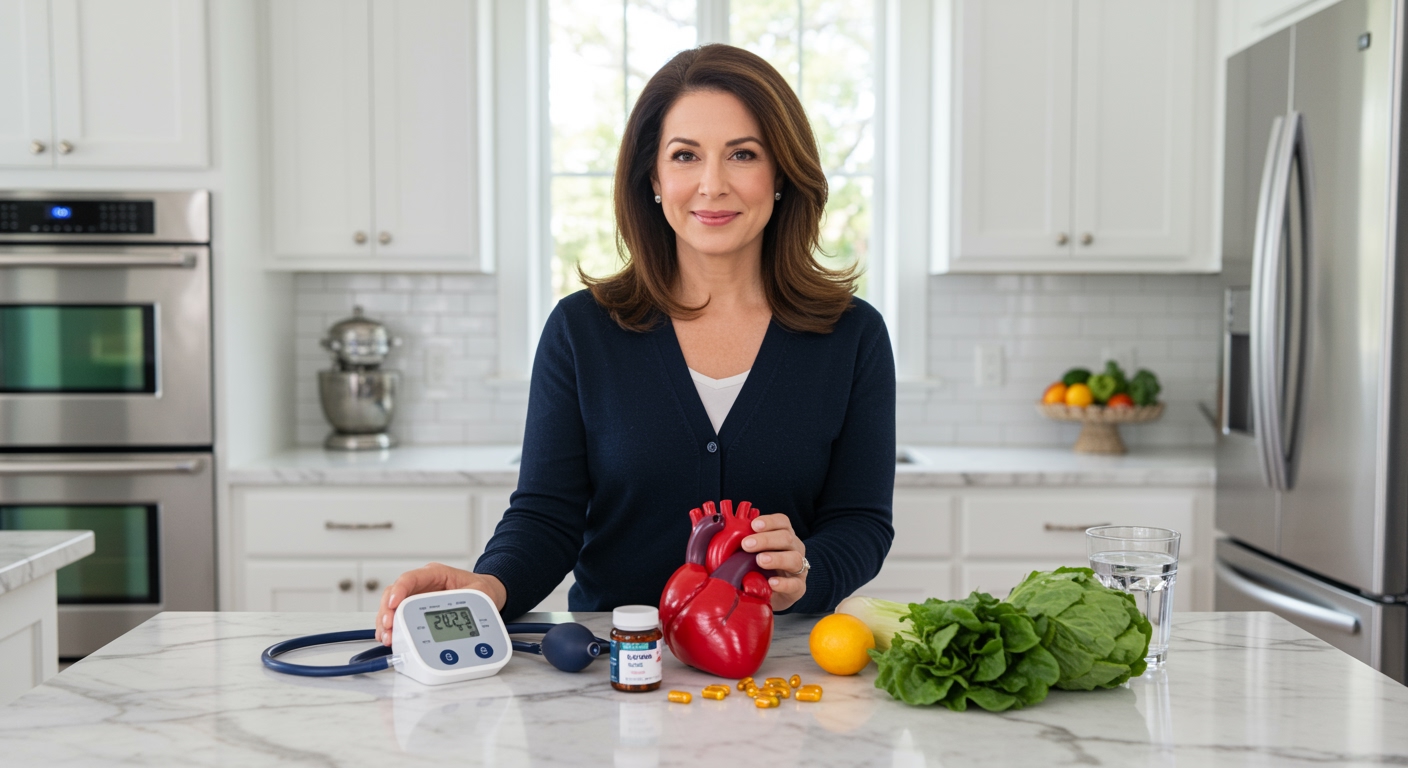✪ Key Takeaway: CoQ10 can lower blood pressure by 4-17 mmHg through improved cellular energy production and antioxidant protection.
Introduction
Your doctor just told you that your blood pressure is too high and you need to make changes now.
You might be wondering if there are natural ways to support your cardiovascular health without immediately jumping to prescription medications.
Hi, I’m Abdur, your nutrition coach and today I’m going to explain how Coenzyme Q10 might help lower your blood pressure naturally and what the science really says about this powerful antioxidant.
What exactly is Coenzyme Q10 and how does it work?
Coenzyme Q10 is a naturally occurring compound that your body produces in every single cell.
Think of it as the spark plug for your cellular engines called mitochondria.
Your heart muscle contains more mitochondria than almost any other tissue because it needs constant energy to pump blood throughout your body.
When CoQ10 levels drop, your heart struggles to produce the energy it needs to function optimally.
At the cellular level, CoQ10 works within the electron transport chain to help convert nutrients into adenosine triphosphate, the energy currency your cells use.
This process becomes less efficient as you age, which is why your natural CoQ10 production decreases significantly after age 30.
The compound also acts as a powerful antioxidant that protects your blood vessels from oxidative damage that can contribute to high blood pressure.
✪ Fact: Your heart contains 10 times more CoQ10 than your liver, highlighting its crucial role in cardiovascular function.
Does research support CoQ10 for blood pressure reduction?
Multiple clinical studies have shown that CoQ10 supplementation can produce significant reductions in blood pressure.
A comprehensive analysis of 12 clinical trials found that CoQ10 reduced systolic blood pressure by an average of 17 mmHg and diastolic pressure by 10 mmHg.
These results are particularly impressive because they occurred without any reported side effects in the study participants.
The blood pressure lowering effects typically become noticeable after 4-12 weeks of consistent supplementation.
Researchers believe the mechanism works through improved endothelial function, which is the ability of your blood vessel walls to relax and contract properly.
When your endothelium functions better, your blood vessels can dilate more effectively, reducing the pressure needed to pump blood through your circulatory system.
The antioxidant properties of CoQ10 also help protect nitric oxide, a molecule that signals blood vessels to relax and maintain healthy circulation.
✪ Pro Tip: Take CoQ10 with a meal containing healthy fats to improve absorption by up to 300%.
How much CoQ10 should you take for blood pressure benefits?
Most successful studies used doses ranging from 100-300 mg of CoQ10 daily, divided into two or three doses.
Starting with 100 mg twice daily with meals is a reasonable approach for most people.
Your body can only absorb limited amounts at one time, which is why splitting the dose throughout the day works more effectively than taking it all at once.
The ubiquinol form of CoQ10 is generally better absorbed than the ubiquinone form, especially if you are over 40 years old.
Quality matters significantly with CoQ10 supplements because cheaper versions often contain poorly absorbed forms that provide minimal benefits.
You should take CoQ10 with meals containing some fat because it is a fat-soluble compound that requires lipids for proper absorption.
Most people notice improvements in energy levels within 2-4 weeks, while blood pressure benefits typically require consistent use for 8-12 weeks.
✪ Note: CoQ10 can interact with blood thinning medications, so consult your doctor before starting supplementation.
Are there any risks or side effects to consider?
CoQ10 is generally considered safe for most people when taken at recommended doses.
Some people may experience mild digestive upset, especially when starting supplementation or taking large doses on an empty stomach.
Taking CoQ10 with food and starting with lower doses can help minimize any potential stomach discomfort.
The most important consideration is that CoQ10 can enhance the effects of blood thinning medications like warfarin.
If you take any prescription medications, especially for heart conditions or blood clotting, you should discuss CoQ10 supplementation with your healthcare provider first.
Some people report feeling more energetic when taking CoQ10, which might interfere with sleep if taken too late in the day.
Taking your last dose with lunch rather than dinner can help prevent any potential sleep disruption while still providing cardiovascular benefits.
✪ Pro Tip: Monitor your blood pressure regularly when starting CoQ10 to track your individual response.
The Bottom Line
CoQ10 shows genuine promise as a natural approach to supporting healthy blood pressure through improved cellular energy production and antioxidant protection.
Remember, supplements work best when combined with a healthy lifestyle, not as a replacement for good nutrition and regular exercise.
I would love to hear about your experiences with CoQ10 or any questions you might have about natural approaches to cardiovascular health in the comments below.
References
At NutritionCrown, we use quality and credible sources to ensure our content is accurate and trustworthy. Below are the sources referenced in creating this article:
- Cleveland Clinic Journal of Medicine: Coenzyme Q10 and cardiovascular disease
- PubMed: Coenzyme Q10 in the treatment of hypertension
- PMC: Coenzyme Q10 and Cardiovascular Diseases
- British Journal of Cardiology: Coenzyme Q10 and cardiovascular disease





